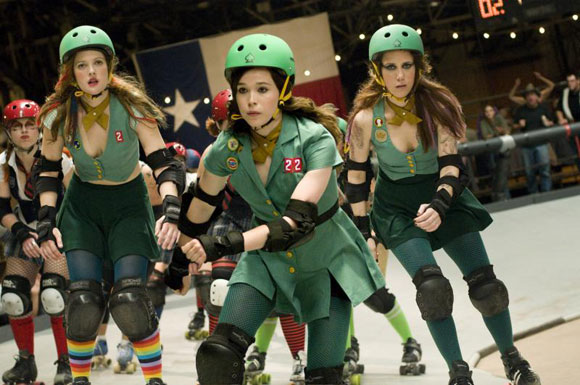Whip It

Bliss Cavendar (Ellen Page) is incongruous among the Southern Belles at the Bluebonnet pageant in the fictional town of Bodeen, Texas. Her mother, Brooke (Marcia Gay Harden), seems at first an affluent, suburban pageant mom, stressing how critical an opportunity it is for her daughter. In their initial presentation, Bluebonnet candidates are asked if they could dine with one person, who would it be. Most of them cite a family relative, usually the mother, as some form of oblation to the parents who thrust them there. Brooke is disappointed when Bliss breaks tradition.
Bliss works at a local diner, is occasionally harangued by schoolmates, shuns being labeled “alternative,” and hangs out with her friend Pash (Alia Shawkat) who, unlike Bliss, has a modicum of conscientiousness about parental authority, “I give my parents straight-A’s, get freedom in return.”
Brooke soon realizes she’s not reaching her daughter. Attemping to bond, she takes Bliss to Urban Outfitters to get a pair of shoes. There Bliss bumps, literally, into the Holy Rollers, a roller derby team from nearby Austin—dropping off fliers for their next competition. Bliss decides to sneak off on the bingo bus into Austin to check out the Rollers. She eventually joins the ranks of a competing team, the Hurl Scouts, quickly earning the nickname Babe Ruthless.
Sight gags abound, including a neck-braced Drew Barrymore and Bliss commenting, “The last roller skates I wore had Barbie on them,” followed up later by a shot of Bliss donning the skates which still fit—underscoring a childhood not as distant as she would have her team-mates believe. As is customary, the film does devolve into competition montages, culminating in a typical time conflict: The Bluebonnet finals land on the same day as the roller derby finals. Ultimately, however, Whip It is a coming-of-age story told straight, devoid of trendy hipster sensibilities, yet aiming equally for entertainment as well as insight.
Whip It, Drew Barrymore’s directorial debut, is neither thematically complex or great cinema. But I can appreciate the sentiment with which the seasoned actor of thirty years, producer of fifteen years, has undertaken the project. Based on the book Derby Girls and its screen adaptation, both by Shauna Cross, the film is light drama, straightforwardly expositive. A more experienced director could take on more elaborate plot and narrative elements, but a modest story gives her an opportunity to succeed in nailing down the core principles of good directing. There’s nothing absurdly executed in this movie. Each actor demonstrates competency in their role, including a restrained Jimmy Fallon, announcer Johnny Rocket, who otherwise falls over himself when saddled with anything heavier than vaudevillian humor. Andrew Wilson—quite visibly the brother of Owen and Luke—completes the team as the Rollers’ coach, eccentrically dressed like 1970’s tennis great Björn Borg. Consider how deftly the cliché of boyfriend dependence is avoided here, when a musician named Oliver (Landon Pigg) cheats on Bliss. A male director may have put her back on the market, yet this story sticks to its morals without ricocheting into typecast feminism.
Ms. Barrymore makes only brief appearances as Smashley Simpson. While a staple of narcissistic directors, it’s a forgivable cameo, since her intent is less self-promotion than demonstration of team spirit—engaged with cast and crew on both sides of the lens. Kirsten Wiig, as Maggie Mayhem (based on Cross, of the Los Angeles Derby Dolls), has a couple breakout scenes showcasing her talent with absurdist humor. To Bliss’ surprise, Maggie also reveals herself to be a responsible parent proffering parental wisdom on accountability and parent-child dynamics.
But the standout performances belong to Ellen Page and Marcia Gay Harden. The pageant mother stereotype cracks as we discover Mrs. Cavendar is a mail carrier, barely making ends meet with husband Earl (Daniel Stern). Earl and Brooke’s relationship is strained by dichotomous personalities. Working earlier hours so he can watch football afternoons in the back of his van, Earl loves his wife but they’ve drifted since high school. The film takes a serious tone when Bliss comes home to a soused, captious Mrs. Cavendar—projecting inadequacies upon her daughter.
Since her breakout role as Hayley Stark in David Slade’s Hard Candy, Ellen Page’s banal precociousness has bothered the living hell out of me. Here, Ms. Barrymore manages to accomplish the impossible: I liked Ellen Page. With guidance, her lacquered cleverness is tempered and a realistic teenager, appropriately insecure for her age, emerges. Ms. Page deserves credit for breaking from typecast in a way that still eludes Juno co-star Michael Cera.
Many experienced directors fail miserably at the key task of providing script and character guidance to actors. George Lucas, for all his billions of dollars and technical achievements, has not an ounce of dramatic comprehension. Having thirty years of acting experience, Drew Barrymore could become as accomplished as her mentor, Steven Spielberg. A year older than her, I have watched the seed transform into seedling, muddle through bad films as a sapling, blossom into a charming adult actor, and now germinate another generation of actors. It is not without coincidence her production company is named Flower Films.
 Whip It • Dolby® Digital surround sound in select theatres • Aspect Ratio: 2.39:1 • Running Time: 111 minutes • MPAA Rating: PG-13 for sexual content including crude dialogue, language and drug material. • Distributed by Fox Searchlight Pictures
Whip It • Dolby® Digital surround sound in select theatres • Aspect Ratio: 2.39:1 • Running Time: 111 minutes • MPAA Rating: PG-13 for sexual content including crude dialogue, language and drug material. • Distributed by Fox Searchlight Pictures